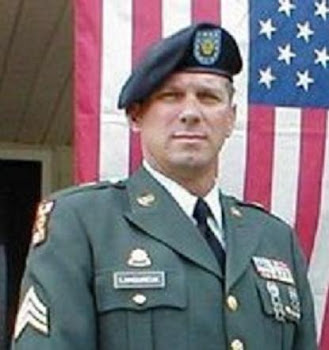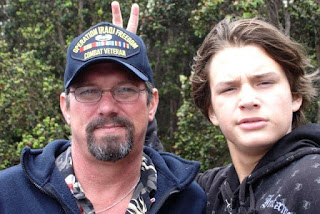Law enforcement & Veterans have common ground:
1) To serve
2) To protect
3) Post-traumatic Stress Disorder (PTSD)
Before you judge a Veteran with PTSD, read this.
It is apparent that law enforcement has its own issues with PTSD. Law enforcement officials acknowledge that memories haunt officers for years after the incidents they experience. The officers see dead people and things that aren't real. They act out in ways that would be considered out of character.
What about our VETERANS? These things can't happen to them as well?
* * * * * * * * * * * * * * * * * * * * * * * * * *
WHEN GREEN TURNS TO BLUE(1)
Modeled after a program in Boston, the West Coast Post-Trauma Retreat is one of just two residential treatment programs in the world for first responders. It is a discreet program set up by cops for cops, firefighters and other "first-responders" who suffer post-traumatic stress, deep depression and other symptoms stemming from what they see or do on the job.
"We see things people aren't supposed to see. We are the ones that are supposed to solve the problems. When we can't or when we feel maybe we helped make it worse, our minds just can't cope with that sometimes," said Rick Mattos, president of the California Association of Highway Patrolmen.
“Imagine just lying in bed and you can smell the crime scene 10 years later. Or look in the mirror and see a dead person who isn't there. These are symptoms people really have", said Joel Fay, a 30-year San Rafael police officer and psychologist who directs the retreat, part of the First Responder Support Network.
Symptoms take time to rear up, said Fay. For some it takes decades, with heavy drinking and divorce the frequent fallout.
Former cop Joseph Ba-uelos easily recalls standing in his yard two years ago, shooting rounds into the grass and thrusting a gun in his mouth.
A state drug agent who had worked in west Contra Costa County, buying undercover on the same Richmond streets where he grew up, Ba-uelos was arrested twice over a weekend for driving drunk, he said. A year earlier he'd blown a 0.26 on a breathalyzer - more than three times the legal limit.
He'd screwed up at work and his days as a cop would soon end.
Worse, the images of past calls haunted him:
Turning a corner and seeing a 16-year-old boy who had shot himself in the head "looking at me, and as God is my witness I thought I heard him say, 'Mom, please help.'"
The bullet that hit a 12-year-old, with Ba-uelos unable to move as rifle shots flew and the father pleaded for help as the boy bled out in his arms.
Lately, its leaders say they see more people with military service - cops who were deployed as reserves, for instance, or soldiers who return home to jobs in law enforcement. Focus on PTSD in soldiers has grown dramatically, with studies showing huge numbers from the Iraq War.
But sometimes it turns up later, after the uniform turns
from green to blue. (1)
* * * * * * * * * * * * * * * * * * * * * * * * * * *
A comment that posted to the article:
About time we took care of those who take care of us. Shameful that most police departments turn their backs on psychological trauma and don't recognize line of duty suicides. Perhaps one day they will.
* * * * * * * * * * * * * * * * * * * * * * * * *(1)
MY COMMENT:
Perhaps one day Americans will not turn their backs on the psychological trauma that our Veterans experience during combat.
________________________________
Reference:
(1) John Simerman Marin Independent Journal.com Posted: 05/31/2009 10:09:19 PM PDT




No comments:
Post a Comment